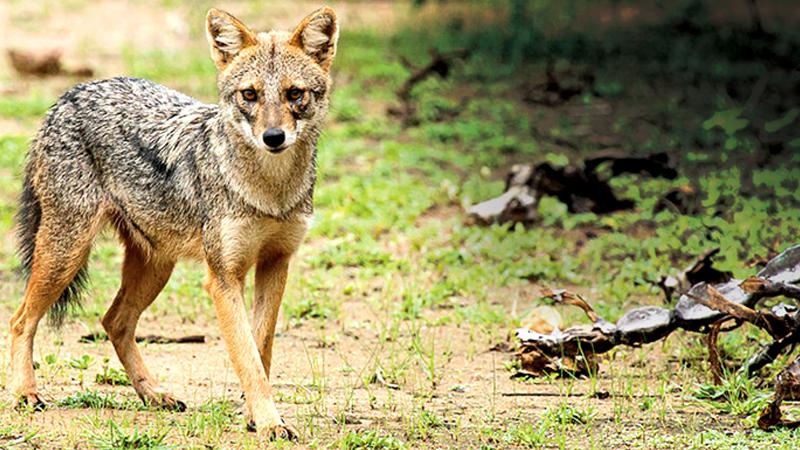
For weeks, several villages in the Kalutara district have been gripped with fear after a series of attacks on people by jackals roaming in the villages. In the most recent incident, last week a 20-year-old boy with special needs was attacked by a jackal at his home in Millewa, Horana. Witnessing the incident, his brother had rushed to help him. He had also been attacked by the jackal. The two brothers sustained minor injuries in the incident and the jackal had escaped.
 But with widespread media coverage and repeated incidents of attacks, some even resulting in the deaths, the public now appears to have turned against jackals despite coexisting prior to the recent attacks. An 8-year-old girl, Kavini Nethsara died on September 9 after being infected with rabies following a jackal attack increasing the fear among villages.
But with widespread media coverage and repeated incidents of attacks, some even resulting in the deaths, the public now appears to have turned against jackals despite coexisting prior to the recent attacks. An 8-year-old girl, Kavini Nethsara died on September 9 after being infected with rabies following a jackal attack increasing the fear among villages.
Residents of Millewa, Millaniya and several other villages have taken to patrolling the area with clubs during the nights on the hunt for jackals. An attack on another boy in Millaniya recently resulted in the death of the jackal as fearful villagers had gone in search of the animal and beaten it to death. According to Wildlife officials, the department is now often flooded with calls from the public, asking for jackals in these areas to be taken away.
Sudden attacks
While attacking humans is not in the nature of jackals, a necropsy carried out on one of the jackals killed by villages perhaps revealed the cause of sudden attacks and change in the animal behaviour. According to the Department of Widlife, tests carried on the corpse revealed that the animal was suffering from rabies. Officials believe that the animals may have contracted the disease from stray dogs in the area.
According to Dr. Tharaka Prasad, the Director of Wildlife Health at the Department of Widlife, the department has identified at least five jackals infected with rabies. “A few have been killed by the villagers,” he said, adding that one jackal, which was in a critical condition, was handed over to Wildlife Department officials by villagers and had died later. According to him, a few cattle in the area have also tested positive for rabies. While there have been previous reports of rabid jackals, however, according to him, this is perhaps the first time such a widespread outbreak of the disease is reported among the jackal population in Sri Lanka.
The Sri Lankan jackal, known by its scientific name Canis Aureus is the only wild canid in the country, according to Dr. Tharaka Prasad. “This species often lives close to villages in wetlands,” he said. According to him, it is a common sight to see them close to paddy fields in the mornings. They often retreat to jungles later in the day.
“Though the media has shown that the jackal comes to villages to attack people, this is untrue,” he said. The animal is shy and often hides away from people. “Instead if they follow people, this could mean that they have been infected with rabies,” he said.
According to the Director of Wildlife Health, the jackals are an important species in the country’s ecosystem. An omnivorous feeder, the jackal often helps in controlling populations of other species, such as peacocks and rats which are considered as pests among farmers. Experts said removing jackals from the ecosystem could contribute to creating an ecological imbalance resulting in the increase of species considered as pests.
According to Widlife Department Director General Chandana Sooriyabandara, many requests from people to remove jackals in their areas to other locations are from areas that have no reported incidents relating to rabid jackals. Sooriyabandara said the panic and fear that has gripped the people is a result of sensationalised media reports on a few incidents. “It is not practical to kill all jackals or remove them from these areas,” he said.
Ecological imbalance
According to experts, the issue has arisen due to poor rabies control. While vaccinations are the only way to control rabies outbreaks, these programs have been stalled recently due to the Covid-19 outbreak. But Kalutara Regional Health Services Director Dr. Udaya Ratnayake said officials have now commenced a program to vaccinate 30,000 domestic dogs in the area.
He said 30 new staffers have been trained to carry out the program. Rathnayake said that the vaccination of dogs in the high risk areas of Millaniya and Madurawala will be completed within two weeks and the vaccination of dogs in Horana and Ingiriya will be completed within the next two months.
Dr. Tharaka Prasad said the Widlife Department has taken steps to ensure the safety of the people and the animals. “We have put up signboards asking people not to attack jackals in the area and avoid the animal,” he said. While rabies vaccination programs have commenced for dogs in the area, officials are also looking at the possibility of vaccinating jackals in high risk areas, he added.
